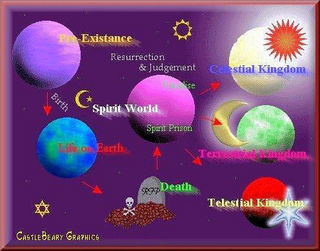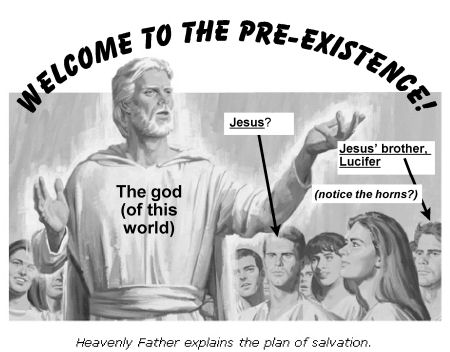A unique facet of Mormonism is our view of God’s plan for his children, or our purpose in life. Today’s lesson focuses on what JS restored regarding this plan.
 The beginning of the lesson talks about Joseph’s re-translation of the Bible (the JST) that resulted in clarifying passages and words throughout the Bible, the Book of Moses, the expansion of Matthew 24, and several “spin-off” revelations as Joseph asked for further enlightenment about different principles, including D&C 74, 76, 77, 86 and 91. From the Book of Moses:
The beginning of the lesson talks about Joseph’s re-translation of the Bible (the JST) that resulted in clarifying passages and words throughout the Bible, the Book of Moses, the expansion of Matthew 24, and several “spin-off” revelations as Joseph asked for further enlightenment about different principles, including D&C 74, 76, 77, 86 and 91. From the Book of Moses:
“For behold, this is my work and my glory—to bring to pass the immortality and eternal life of man.” Moses: 1:37, 39
The “Plan of Salvation” as we have it today resulted from JS’s efforts to restore “plain and precious” parts of the scriptures that would more clearly explain what happened before we were born, what happens after we die, and why we are here on the earth. Some components that were restored or clarified by JS:
- That we existed before birth in a pre-mortal world with God & Jesus. Exactly what this looked like is still up for grabs, though. Did we live in families? In BYU-approved housing? Was there a dress code?
- That there was a plan, and we all sanctioned it. Even those who have never voted in a single election apparently weighed in on this one.
- That Satan had an alternate plan that was rejected, resulting in his being cast out. I always wonder if we had debates or if we vacillated at all; or were we just so dang smart we immediately saw through that “bad” plan?
- That matter is eternal; that God “organized” rather than “created” the earth. That we are eternal in nature, without beginning or end. This puts us on much more equal footing with God than in other faiths, and is considered blasphemous to some. Yet, as a Mormon, I have to say this is one aspect of our religion that totally ROCKS!
- That obtaining a body, gaining knowledge and growing in faith are the purpose of life on earth. This is a Mormon way of putting it; the Protestant version is that we believe our works save us rather than grace. It is through grace we are saved; it is through our progression we increase our ability to withstand glory (God’s and our own).
- That beings with bodies are more powerful than beings of Spirit only. The body is not a corruption that defiles us; it glorifies us and is a part of the soul. This is again, a very unique teaching of Mormonism. The body is not just a hollow husk that we gratefully discard at death; it is essential to our progress, and it is more glorious and powerful than spirit alone.
- That each of us has moral agency and will be held responsible for our choices of good or evil; that those choices affect our ability to receive and channel spiritual light. We are constantly in motion, either progressing or digressing. This idea that it’s not really possible to stand still is probably true, but a little disturbing. Life is long.
- That our eternal reward is not pass/fail, but is based on the degree of glory we have attained through enlightenment, faith, increasing our intelligence, and becoming like Christ and our father in Heaven. Another aspect of Mormonism that I find very appealing; we are not “God’s pets,” but His children.
Q: Are there other specific aspects of the plan of salvation and the purpose of life that we know because of revelations to the Prophet Joseph Smith that I missed?
Q: Which of these do you find most compelling, enlightening and helpful? Are there any you don’t care for or find helpful?
Q: Do you like our plan of salvation more or less than those proposed by other religions (e.g. Hinduism, Islam, Protestantism, Catholicism)? What do you like and not like?
“Intelligence is eternal and exists upon a self-existent principle. It is a spirit from age to age and there is no creation about it. All the minds and spirits that God ever sent into the world are susceptible of enlargement. God himself, finding he was in the midst of spirits and glory, because he was more intelligent, saw proper to institute laws whereby the rest could have a privilege to advance like himself. The relationship we have with God places us in a situation to advance in knowledge. He has power to institute laws to instruct the weaker intelligences, that they may be exalted with himself, so that they might have one glory upon another, and all that knowledge, power, glory, and intelligence, which is requisite in order to save them in the world of spirits.” (1844)
Q: How does this influence the way we understand our own nature? How does this influence how we should treat other people?
Q: Are you one of the stronger or weaker intelligences? How do you know? When you meet a weaker intelligence, do you think “I am so awesome!”? Do you think that’s what happens when a stronger intelligence meets you?
Bodies Rule!
“The design of God before the foundation of the world was that we should take tabernacles [bodies], that through faithfulness we should overcome and thereby obtain a resurrection from the dead, in this wise obtaining glory, honor, power, and dominion.” (1843)
“We came to this earth that we might have a body and present it pure before God in the celestial kingdom. The great principle of happiness consists in having a body. The devil has no body, and herein is his punishment. He is pleased when he can obtain the tabernacle of man, and when cast out by the Savior he asked to go into the herd of swine, showing that he would prefer a swine’s body to having none. All beings who have bodies have power over those who have not.” (undated, JS quoted by William Clayton)
Q: How does this knowledge affect the way we should care for our bodies? How is this unique perspective different from other religions? From secular views?
Q: How can we strengthen the connection between our bodies and spirits to make our bodies receptacles of light?
You Wish The Devil Made You Do It
“President Joseph Smith … observed that Satan was generally blamed for the evils which we did, but if he was the cause of all our wickedness, men could not be condemned. The devil could not compel mankind to do evil; all was voluntary. Those who resisted the Spirit of God, would be liable to be led into temptation, and then the association of heaven would be withdrawn from those who refused to be made partakers of such great glory. God would not exert any compulsory means, and the devil could not; and such ideas as were entertained [on these subjects] by many were absurd.” (1841, paraphrased in Times & Seasons)
“Satan cannot seduce us by his enticements unless we in our hearts consent and yield. Our organization is such that we can resist the devil; if we were not organized so, we would not be free agents.” (1841, JS quoted by William P. McIntire)
Q: Does this view marginalize Satan’s influence because we are really the ones who are free agents and responsible for our actions? Would you rather you could blame Satan for your shortcomings?
Q: Does Satan like his job or does he think it totally blows but he’s just putting on a happy face for the minions? Does he get burned out? Is he just watching the millennial clock?
For the teachers out there, good luck! For the rest of you, discuss.


Comments 5
Very well said.
That’s kind of a weird little picture (under “Welcome to the Pre-Existence.”) What is it supposed to mean?
Author
BiV – yeah, it is weird. Got it from Google images, perhaps from an antiMo site. I actually didn’t check the site. I just thought both images were kind of weird. The first is from a pro site. But it is funky looking.
It conjures up funny images of when I was Deacon-aged and our teacher drew a series of circles and squiggly lines on the chalkboard and asked us what this was. We were all relieved… we had braced ourselves for The Morality Lesson.
Good thing back then it was called the Plan of Salvation, not the Plan of Happiness. I don’t think we would have calmed down till he launched into the Pre-Existence and allayed our fears. 🙂
###
I also have a watershed memory of teachings on this subject when I was in the MTC and the teacher, pulling from Alma 40, taught how the righteous who go to Paradise in v12 was not just contained to being LDS, and how the wicked go to outer darkness (v13). He tried to impress upon us the LDS cultural misunderstanding of this “circle” of the diagram, that it is not a Paradise/prison kind of separation. I remember how radical it felt to me when he taught that all spirits are in Spirit Prison, and would remain so were in not for the Atonement of Jesus Christ, and that missionary work in Spirit Prison was not one of evil people getting a second chance at conversion. He talked about Moroni 8:22 about the state of those not under the Law — that this was not an “outer darkness” state.
He emphasized that our righteousness was one of our state of heart, not a state of our efforts to become righteous. I thought it was a fresh argument then — and a very bold approach now looking back. My doctrinal commitments are not exactly the same now, yet, still, I appreciate and admire his example of turning to the LDS scriptures in an effort to help us missionaries shape our understanding as much as possible by them and not by what we culturally assumed.
Thanks to JustforQuix for the squiggly lines/plan of happiness thought—-I had to explain to others at work why I was laughing so hard….good thing I’m the boss….